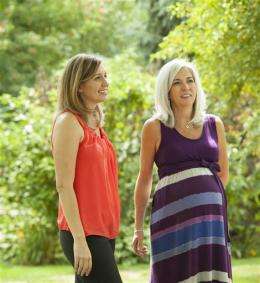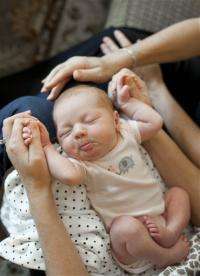Emily Jordan, left, examines the pregnant belly of her mother Cindy Reutzel on Sunday, Aug. 19, 2012 in Naperville, Ill. After Jordan underwent a radical hysterectomy, she and her husband took up an offer from Reutzel to act as a surrogate for their child. (AP Photo/Sitthixay Ditthavong)
(AP)—Emily and Mike Jordan couldn't help but feel anxious.
More than two years before, at age 29, Emily had been diagnosed with cervical cancer. But just before she was to undergo a radical hysterectomy, she was told that she was pregnant. Faced with saving her life or their unborn child's, the young couple made the excruciating decision to go forward with her surgery. It meant losing the baby and forfeiting any chance at having children.
Or so they thought.
"I can't describe what that was like after finding out you have cancer, after finding out your chance of ever carrying a baby is gone," Emily says.
But now, more than two years later, she and Mike had come to a Chicago hospital to realize the dream they thought was lost—to become parents, though not the way they had imagined.
Alongside them was Emily's mother, Cindy Reutzel—a fit, silver-haired 53-year-old grandmother with a pregnant belly.
Reutzel was about to give birth to her own grandchild.
___
Just 34 years ago, Louise Brown, the first "test tube" baby, was born in Great Britain. The result? A veritable in-vitro baby boom.
It started with would-be mothers in their 20s and 30s. "Then people started pushing the envelope," says Dr. Helen Kim, director of the in vitro fertilization program at the University of Chicago. "If you could help a menopausal woman in her 30s, could you help a menopausal woman in her 40s? And then it became, 'Can you help a menopausal woman in her 50s?'
"And the answer is yes."
Some older women were having their own babies. But more often, they were using egg donors to have their own children, or serving as surrogates or "gestational carriers."
Emily Jordan, left, and her pregnant mother Cindy Reutzel relax at Jordan's home on Sunday, Aug. 19, 2012 in Naperville, Ill. After Jordan underwent a radical hysterectomy, she and her husband took up an offer from Reutzel to act as their surrogate. (AP Photo/Sitthixay Ditthavong)
There was the 51-year-old grandmother in Brazil who gave birth to her twin grandchildren in 2007. There've been others, grandmothers in their 40s or 50s and even 60s.
Cindy Reutzel, Emily's mom, had a vague recollection of those stories. So when doctors shared the news that they had been able to keep Emily's ovaries intact, Reutzel immediately made the offer.
"What if I carried your baby for you?" she asked.
Emily and Mike didn't take it too seriously at first. "We didn't really think that was a realistic option," says Emily.
It turned out that it wasn't that far-fetched, particularly for a young grandmother who's in good health.
Emily Jordan, right, chats with her pregnant mother Cindy Reutzel on Sunday, Aug. 19, 2012 in Naperville, Ill. After Jordan underwent a radical hysterectomy, she and her husband took up an offer from Reutzel to act as their surrogate. (AP Photo/Sitthixay Ditthavong)
After a process that included psychological evaluation and hormonal manipulation to prepare their bodies, Kim eventually implanted Reutzel's uterus with an embryo created with an egg from Emily and Mike's sperm.
"The thought of Emily and Mike not being able to have children and share that piece of their lives with someone just broke my heart," says Reutzel. "I want Emily to have that connection with another human being like I had with her."
As her belly grew, people started asking about "her baby." But she was quick to tell them the story.
She worried about the physical toll pregnancy might take, though her body handled it better than she expected. She wondered how well she'd bounce back from a Caesarean section. That's how she had delivered Emily and her older brother, but that had been three decades ago.
Six-day-old Elle Cynthia Jordan is held by her mother Emily Jordan and grandmother Cindy Reutzel on Wednesday, Sept. 5, 2012 in Naperville, Ill. After Jordan underwent a radical hysterectomy, she and her husband accepted an offer from Reutzel to act as a surrogate for their child. (AP Photo/Sitthixay Ditthavong)
Still, she assured Emily and Mike throughout the pregnancy that the baby was fine, she was fine, everything would be fine.
"This is a continuation of everything that she has done her entire life for me, which is to make sure that I have the best life possible," Emily says.
All they could do, they said, was to promise to raise their baby as best they could. And that was enough for Reutzel.
"I know I gave a gift," she says. "But I'm also getting so much in return."
Last week, a few days after Emily's 32nd birthday, daughter sat next to mother, holding hands in the delivery room.
And Elle Cynthia Jordan was born.
"She looks just like you! She looks just like you!" Emily shouted, running from the delivery room to introduce their newborn to Mike.
Reutzel is recovering well. She even says she'd consider doing it again.
"When I watch both of them hold that baby and look into her face, it's like everything I could have imagined wanting for them—better than I could have imagined," she says, her eyes filling with tears.
"This is what it was all about for me."
Copyright 2012 The Associated Press. All rights reserved. This material may not be published, broadcast, rewritten or redistributed.

























